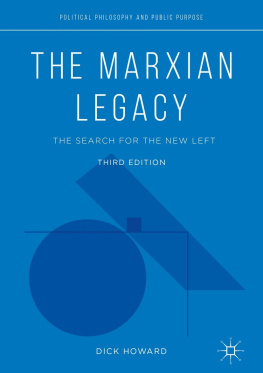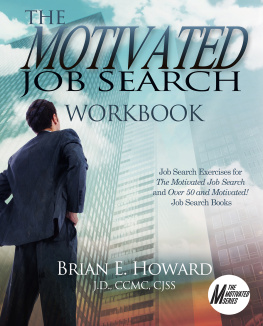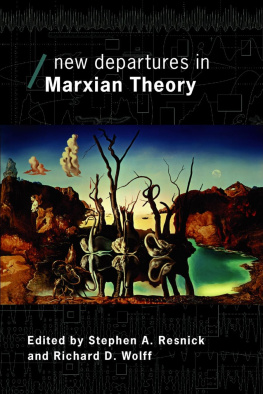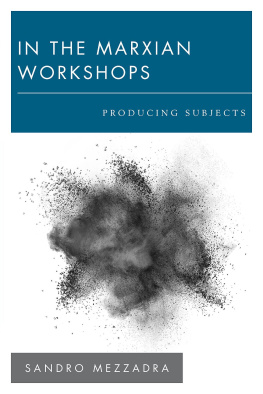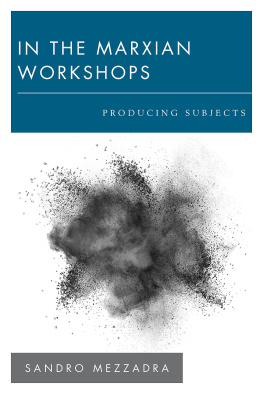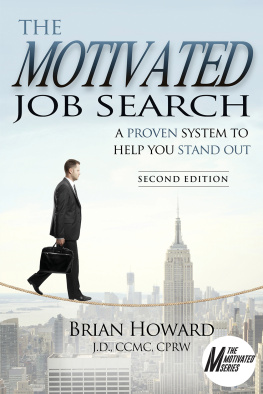Dick Howard - The Marxian legacy : the search for the new left
Here you can read online Dick Howard - The Marxian legacy : the search for the new left full text of the book (entire story) in english for free. Download pdf and epub, get meaning, cover and reviews about this ebook. year: 2019, publisher: Palgrave Macmillan, genre: Science / Politics. Description of the work, (preface) as well as reviews are available. Best literature library LitArk.com created for fans of good reading and offers a wide selection of genres:
Romance novel
Science fiction
Adventure
Detective
Science
History
Home and family
Prose
Art
Politics
Computer
Non-fiction
Religion
Business
Children
Humor
Choose a favorite category and find really read worthwhile books. Enjoy immersion in the world of imagination, feel the emotions of the characters or learn something new for yourself, make an fascinating discovery.
- Book:The Marxian legacy : the search for the new left
- Author:
- Publisher:Palgrave Macmillan
- Genre:
- Year:2019
- Rating:4 / 5
- Favourites:Add to favourites
- Your mark:
- 80
- 1
- 2
- 3
- 4
- 5
The Marxian legacy : the search for the new left: summary, description and annotation
We offer to read an annotation, description, summary or preface (depends on what the author of the book "The Marxian legacy : the search for the new left" wrote himself). If you haven't found the necessary information about the book — write in the comments, we will try to find it.
The Marxian legacy : the search for the new left — read online for free the complete book (whole text) full work
Below is the text of the book, divided by pages. System saving the place of the last page read, allows you to conveniently read the book "The Marxian legacy : the search for the new left" online for free, without having to search again every time where you left off. Put a bookmark, and you can go to the page where you finished reading at any time.
Font size:
Interval:
Bookmark:
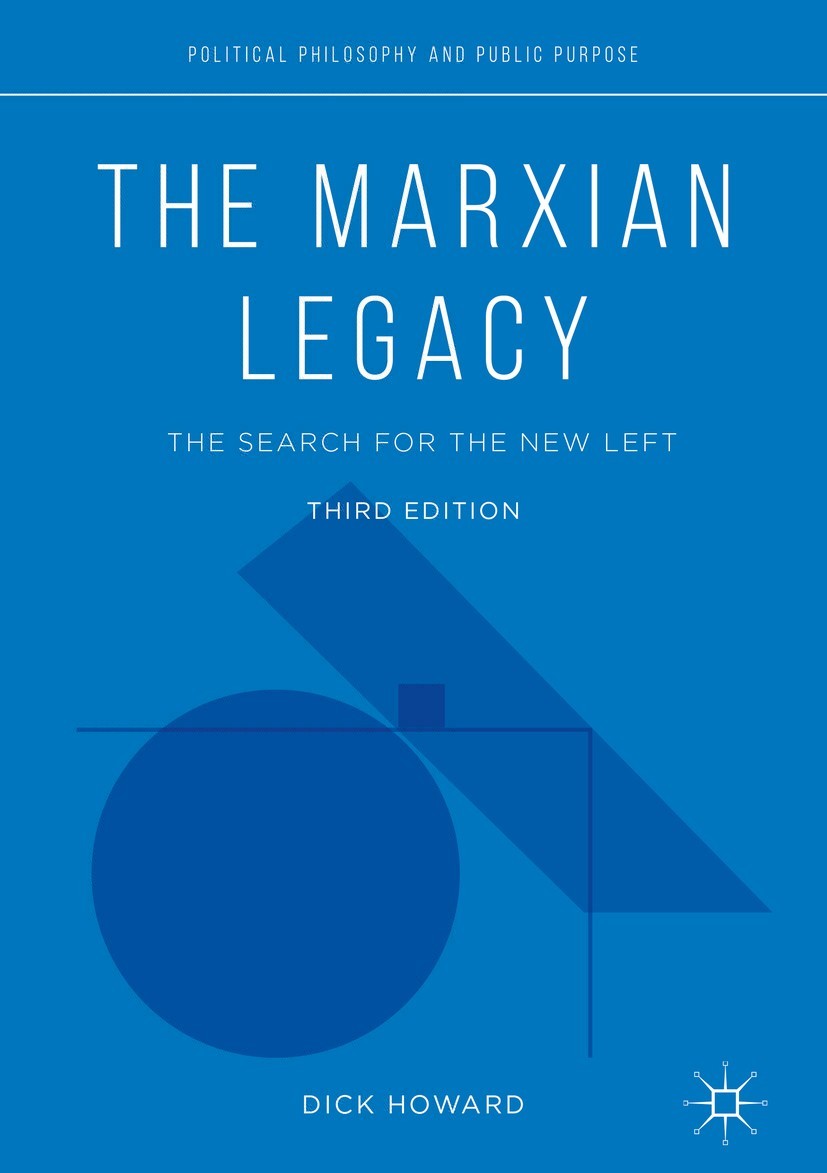
This series offers books that seek to explore new perspectives in social and political criticism. Seeing contemporary academic political theory and philosophy as largely dominated by hyper-academic and overly-technical debates, the books in this series seek to connect the politically engaged traditions of philosophical thought with contemporary social and political life. The idea of philosophy emphasized here is not as an aloof enterprise, but rather a publicly-oriented activity that emphasizes rational reflection as well as informed praxis.
More information about this series at http://www.palgrave.com/gp/series/14542

Cover design by Laura de Grasse
This Palgrave Macmillan imprint is published by the registered company Springer Nature Switzerland AG.
The registered company address is: Gewerbestrasse 11, 6330 Cham, Switzerland
In Memory of
Cornelius Castoriadis (19221997)
And
Claude Lefort (19242010)
As a new era of populism dawns, there is a kind of nostalgia that sets in when thinking about how the New Left of the late 1960s and 1970s unfolded. It is all too easy to forget the seriousness of the ways that this generation was rethinking society, culture, politics, the family, and the self. It is all too easy for its intellectual and political impulses to be obscured by the way it has been framed in popular memory and consciousness mediated by the conservative 1980s: as a movement bloated by hyper-idealism, reckless social criticism , evincing what Samuel Huntington referred to in the 1970s as an excess of democracy . What all of this hides from view, however, is the ways that many of this generationboth in the West and the Soviet Eastwere rethinking democracy and, more centrally, the ideas of Marx. In this sense, Dick Howards seminal book, The Marxian Legacy , is at once both a document of that periods attempt to rethink and recreate Marxian critique and a document marking a crucial evolutionary stage in Marxian theory itself.
I first encountered the first edition of this book in the 1990s when, as a graduate student , I was engaged in my own project of reconstructing the shattered pieces of Western Marxism into a more coherent, critical form of theory. Amid the debris left in the wake of postmodern political theory and philosophy , it was a tonicfor it framed Marxism as a reservoir of ideas and principles that could help shape a new critical consciousness . Howards exploration of the ideas of Ernst Bloch , Rosa Luxemburg , Max Horkheimer, and Jean-Paul Sartre , among others, retains its ability to reward those who see the need for a form of critique that can retain both its power to give insight into the realist-materialist structures of power and the humanistic-democratic ideas that must serve to displace and transform them. For this reason, Howard sees Marxs ideas as currently in evolution and development by successive generations of radical thinkers. Just as the writings of the Young Marx were once used to critique the orthodox scientism of rigid orthodoxy, so today can we see in the Marxian legacy a capacity of a renewal of more robust democratic and humanist principles that underwrite the Marxian project of critique.
Such a project is in need now just as urgently as in the past. New forms of authoritarianism are gaining legitimacy, populism has taken a decidedly right-wing turn, democratic movements and associations have withered. We are in the midst also of a long counter-revolution against the cultural and institutional progress made during the middle of the twentieth century. A more rapacious form of capitalism has been untethered from social-democratic institutional constraints, the legitimacy of the business community and its culture of consumption and entrepreneurship has colonized the culture, oligarchic inequality reigns supreme, and the degradation of society and the natural environment both threaten to undermine society. The early decades of this century have therefore shown that Marxs relevance persists even as a new generation now seems less aware of the deeper political and philosophical debates that formed the ideas of earlier radical thinkers. As populist ressentiment has increased and democratic aspirations and values have ebbed, Howards book can help us focus once again on the kind of political ideas we must keep in view. To imagine a more compelling form of democracy , to elicit a radical imagination for troubled times, we can indeed look to Howards important study of the Marxian legacy to plumb the depths of a new political sensibility.
The Marxian Legacy is a book about theory and theorists ; and it is more than that. These thinkers were engaged with their times, facing their present with an eye toward a future whose advent for many had long been symbolized by the name of Marx. This confrontation of the present with the future is the axis of radical critical thought. Critics look to a horizon of potential that sometimes advances brightly before receding as former visionaries find themselves alone with their melancholy. The first two editions of this book were the product of moments when a promised future seemed near. The author was convincedas were the thinkers whom he chose to study as witnesses to the Marxian legacy that theory is even more necessary in such times when the rising tide seems to bear effortlessly the future with it. The critical spirit hesitated, recalling the watchword: No practice without theory. Social conditions in the present cannot alone give birth on their own to a new future; critical and political thought are also necessary. Without it, the tide will ebb, the horizon drifts and fades, while those who have ridden the waves of social discontent that they hoped would make possible overcoming the miseries of the present run aground on granite rocks of resistance or drift exhausted onto the sands of conformity. No social change without political vision is the corollary.
Font size:
Interval:
Bookmark:
Similar books «The Marxian legacy : the search for the new left»
Look at similar books to The Marxian legacy : the search for the new left. We have selected literature similar in name and meaning in the hope of providing readers with more options to find new, interesting, not yet read works.
Discussion, reviews of the book The Marxian legacy : the search for the new left and just readers' own opinions. Leave your comments, write what you think about the work, its meaning or the main characters. Specify what exactly you liked and what you didn't like, and why you think so.

